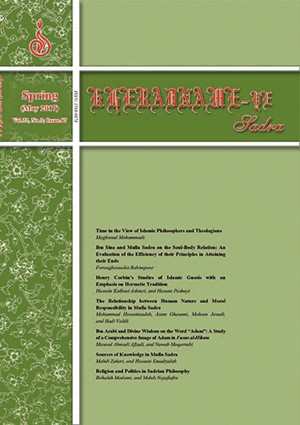Religion and Politics in Sadrian Philosophy
Subject Areas : ملاصدراپژوهی و اندیشۀ حکمت متعالیهMehdi Najafiafra 1 * , Rohalah Modami 2
1 -
2 -
Keywords: Religion politics Transcendent Philosophy Islamic ruler secularism ,
Abstract :
Religion and politics and the relationship between them are among the important problems in Mulla Sadra’s philosophy. In fact, the issue of politics, which is one of the noteworthy realms of human life, never escaped his attention. Mulla Sadra always emphasized Man’s social nature in his works and did not consider individual life to be enough even if it were intertwined with religion. In his view, the development of Man is possible only through living a social life. He also maintained that a society which is geared to provide the context for the growth and development of its members should be governed based on Islamic laws. Politics is different from religion in terms of origin, end, act, and passivity; however, it is completely melted in religion, which is the innermost and truth of politics. Mulla Sadra considered the relationship between religion and politics to be the same as the one between the intelligible and the sensible or between the inward and outward aspects. He argues that as the knowledge of physics is incomplete without the knowledge of metaphysics, using politics without resorting to religion will result in Man’s plunge into forms and ignorance of transcendent truths. This will cause some irreparable damages to human life. A correct clarification of Mulla Sadra’s philosophy is the best barrier against secularism, which emphasizes the separation of religion from politics.
آشتياني، سيد جلال الدين، شرح بر زاد المسافر، چاپ سوم، قم، دفتر تبليغات اسلامي، 1381.
ابراهيمي ديناني، غلامحسين، ماجراي فكر فلسفي در جهان اسلام، ج 3، تهران، طرح نو، 1379.
حسني، ابوالحسن، حكمت سياسي متعاليه، تهران، پژوهشگاه فرهنگ و انديشه اسلامي، 1390.
سروش، عبدالكريم، آيين شهرياري و دينداري، تهران، موسسه فرهنگي صراط، 1376.
ملاصدرا، اسرار الآيات وأنوار البينات، تصحيح، تحقيق محمدعلي جاودان، با مقدمه واشراف آيت الله سيد محمد خامنهاي، تهران، بنياد حكمت اسلامي صدرا، 1389.
ملاصدرا، الحكمة المتعالية في الأسفار الأربعة، ج7، تصحيح، تحقيق ومقدمه دكتر مقصود محمدي، تهران، بنياد حكمت اسلامي صدرا، 1380.
ملاصدرا، الشواهدالربوبية في المناهج السلوكية، تصحيح، تحقيق و مقدمه دكترسيد مصطفي محقق داماد با اشراف آيتالله سيد محمد خامنهاي، تهران، بنياد حكمت اسلامي صدرا، 1382.
ملاصدرا، المبدأ والمعاد في الحكمة المتعالية، ج 2، تصحيح دكترمحمد ذبيحي وجعفرشاه نظري، با اشراف آيتالله سيد محمد خامنهاي، تهران، بنياد حكمت اسلامي صدرا، 1381.
ملاصدرا، المظاهرالالهية في اسرارالعلوم الكمالية، تصحيح، تحقيق و مقدمه آيتالله سيد محمد خامنهاي، تهران، بنياد حكمت اسلامي صدرا، 1378.
طوسي، سيدخليل الرحمان، «ملاصدراي شيرازي و مارتين هايدگر: تحليل انسان شناختي در فلسفه سياسي»، مجموعه مقالات سياست متعاليه از منظر حكمت متعاليه، جلد سوم، پژوهشگاه علوم و فرهنگ اسلامي، 1390.
قدردان قراملكي، حسن، «كندوكاوي در مباني نظري سكولاريزم»، مجله معرفت، ش 27، 1377.
كليني، محمد ابن يعقوب، اصول كافي، ج 1، ترجمه و شرح سيد جواد مصطفوي، گلگشت، 1375.
يوسفي راد، مرتضي، نسبت حكمت و شريعت در حكمت متعاليه، فصلنامة دانشگاه اسلامي، سال دوازدهم، ش3، 1378.
Eliade, Mircea, The Encyclopedia of religion, Vol, 13, Macmillan publishing company, New York, 1987.
Nasr, Seyyed Hossein, Essential Seyyed Hossein Nasr, world wisdom, Indiana, 2007.

